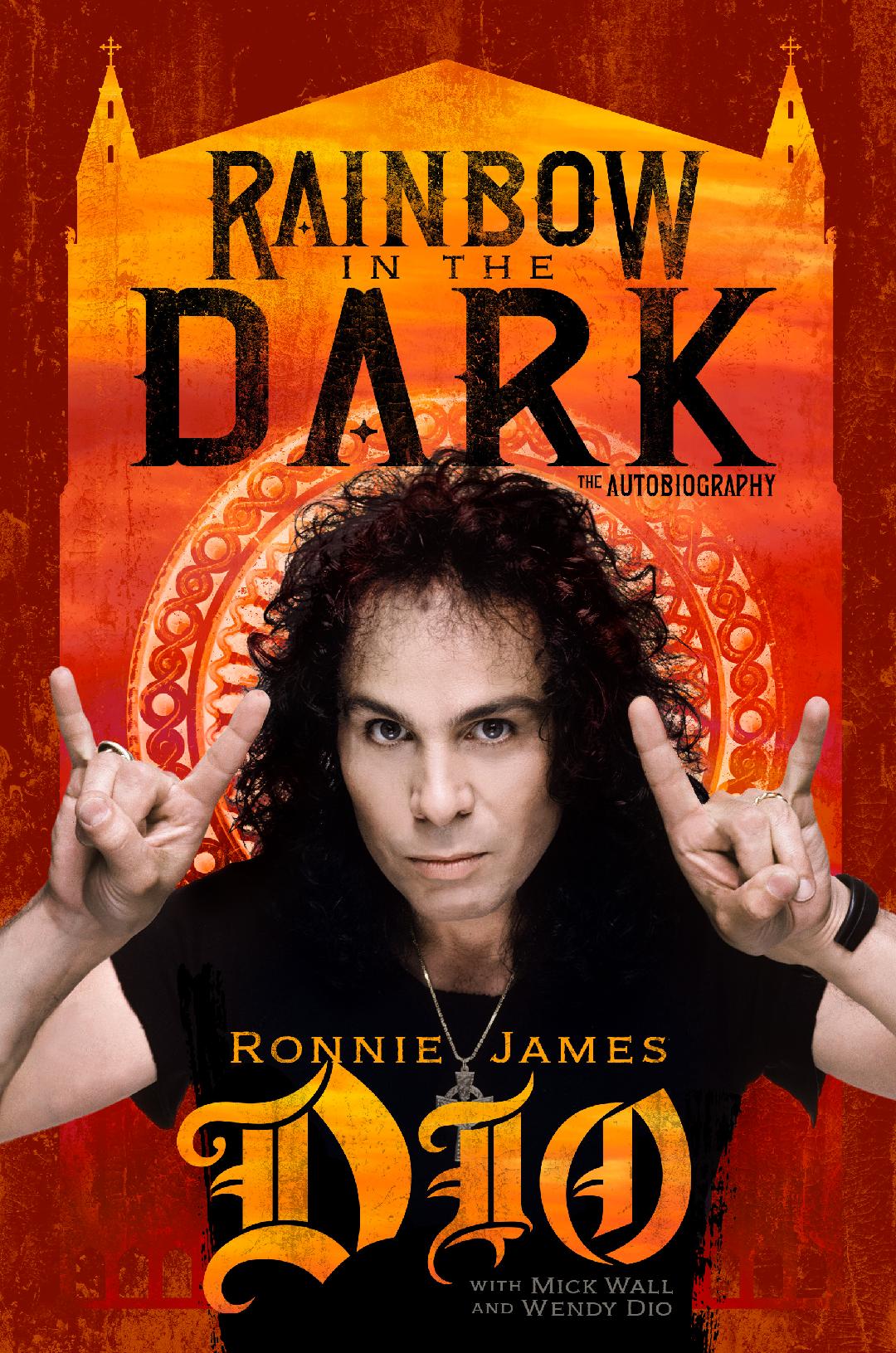Book Review
“Rainbow in the Dark – The Autobiography” by Ronnie James Dio with Wendy Dio and Mick Wall [Book Review]

If you’re a hard rock/heavy metal fan, you undoubtedly know the name Ronnie James Dio. Somewhere along the line, your ears have crossed paths with Elf, Rainbow, Black Sabbath, and/or Dio. If you’re not a heavy metal fan, you’ve probably, at the very least, heard of him. Somewhere along the line, there’s a good chance you’ve seen some yahoo walking down the street with a Dio patch on her/his battle jacket, or have heard a snippet of something from one of the Sabbath albums Dio fronted, or any number of the hits from the Dio albums, even if it’s been via drunken and shitty karaoke renditions.
On a broader cultural note, everyone, heavy metal/hard rock fan or not included, knows about and has seen the index-and-pinky-finger ‘devil horns’ salute. In fact, I’d bet a bunch of money I don’t have that most everyone reading this has flashed the symbol, whether in whole-hearted seriousness or ironic mocking. One of the earliest anecdotes in this, the autobiography of one Ronald James Padavona, the author makes mention of how when growing up, his grandmother used to flash a hand gesture he knew as the Maloik at certain passing pedestrians and bystanders as a spiritual protective measure while walking the mean streets of Cortland, New York. While various explanations have been proffered to the origins of the horns and their relation to heavy metal, Dio makes a pretty good claim as to the how, why, and popularity of the symbol without arrogance or the desire for recognition or anything restitutive. In fact, later when he’s discussing the enthusiastic crowds surrounding Black Sabbath and their collective use of the salute, he seems mostly elated that he was able to have his “gramma” share in and contribute to his success.
Throughout Rainbow in the Dark, the diminutive vocalist with the absolutely not diminutive vocal chords rarely, if ever, lays claim to being an innovator of the scene or culture of heavy metal, despite the man, the voice and the sounds he created becoming inseparable metal icons. For Dio, it was only ever about the music; he just wanted to write and sing to the best of his ability, no matter if he was laying down the boogie rocking blues with Elf, spinning fantastical yarns with the hard-rocking Rainbow, playing a major role in the revitalization of Black Sabbath after substances and the loss of Ozzy Osbourne threatened the band, or fronting his own group to great success.
Covering the “first half of his life story” from early childhood up to the night his band headlined Madison Square Garden in 1986 (fulfilling a dream of his and most New York musicians), Rainbow in the Dark was culled together by Dio’s second wife and long time manager, Wendy Dio and legendary rock journalist Mick Wall from stacks of hand-written pages, folders of notes, dot-matrix print outs, and cocktail napkin recollections into the book’s smooth-flowing narrative. Early on (in the intro written by Wendy, the prologue itself, and the first chapter), one of the ongoing themes becomes evidently salient; that is the idea of how quickly paths can be found or missed. If Mr. Padavona hadn’t forced his baseball-loving kid into trumpet lessons at an early age, we might never be talking about one of the greatest heavy metal singers of all time. Instead, we might be casually brushing aside discussion of a double-A ball role player, because hardly anyone who is 5’3″ tall is going to catch the eye of pro scouts beyond comments about the condensed size of their strike zone.
And if Ronnie hadn’t been forced to play trumpet, his early instructors would never have stopped in wonder about the pint-sized kid’s ability to expel lung capacity like the proverbial motherfucker. And if he hadn’t taken the advice of an early bandmate and stepped up to the mic instead of solely focusing on the bass, who knows what might have never happened? This sort of trailblazing with ambition, but without a blueprint is a theme that pushed Dio from his band leading days in the ’50s and ’60s into Elf, then into Rainbow, then into Black Sabbath, and then towards the idea of going rogue after the success of Heaven and Hell and Mob Rules and bankrolling his own band with his own money and only one riff in the bag.
Fans should also be thankful Dio survived as long and well as he did considering the variety of accidents he and his band got into while on tour back in the ’60s. There were a number of near-tragic and tragic encounters involving cars and other cars, cars and errant animals, vans and drunk drivers and even planes with disabled landing gear before most people even knew the name Ronnie James Dio. Dude had some serious horseshoes rammed up his rumpus. Readers will take note of an ongoing anecdote throughout the book that indicates he’s actually quite lucky he wasn’t taken out by the Miami mob back in the day, if we’re being honest.
But most importantly to the Dio story, is the support system he had around him as he made his musical and business moves. Early on, he always seemed to have a family or marital home waiting for him in Cortland after seasonal residencies, stints on the road, or blocks of time spent recording in studios, not in Cortland. He preferred to set himself up with understanding folks in addition to similarly hard-working, driven and talented players and demanded the best from everyone behind the scenes as well. After meeting and marrying Wendy, he had her as support in the fields of emotional, financial, business, division of labour, and anything else you can imagine that your partner would never in a million years do for you, especially after cutting ties with Black Sabbath following the release of two of the band’s more popular releases.
Rainbow in the Dark is a quick and concise read. There’s no exact indication of how much of the manuscript and Dio’s own words have been sculpted by Wall’s editorial skills and scribe’s eye, but there’s a certain Hemmingway-esque style to the written brevity and to-the-point detail. The book isn’t long to begin with, but it flies by, even if you stop to re-read the passages pertaining to how much money was and wasn’t being made at various points in Dio’s illustrious career, the risks taken in getting Dio (the band) off the ground and how simple he makes something like flying to England to find and try out guitar players on a whim sound.
We’re also not sure over what amount of time the memories and stories compiled in this book were written, the reader can feel Dio’s attitude towards the business shift, especially as his wife positioned herself as an effective and competent manager which allowed him to worry less about the stuff he never liked worrying about in the first place. He does at one point credit, not just his own manager, but all managers for their importance in elevating any musician’s career and the thankless tasks they embark upon. You can also feel Dio’s confidence emerge as he tackles self-doubt and the public’s unjust perceptions as the guy who played a role in yanking Ritchie Blackmore from Deep Purple, replacing Ozzy in Black Sabbath, then leaving Sabbath high and dry for a solo career spotlight. But for Dio, it was always about doing what you love — art above politics regardless of risk. After reading this, it becomes clear why he remains a respected figure in a world most people see as dark and shadowy.
By: Ronnie James Dio, Wendy Dio and Mick Wall
Publisher: Permuted Press
Release Date: July 27th, 2021
Format / Length: Paperback, 264 Pages
ISBN-10: 1642939749
ISBN-13: 978-1642939743
-

 Music1 week ago
Music1 week agoTake That (w/ Olly Murs) Kick Off Four-Night Leeds Stint with Hit-Laden Spectacular [Photos]
-

 Alternative/Rock2 days ago
Alternative/Rock2 days agoThe V13 Fix #011 w/ Microwave, Full Of Hell, Cold Years and more
-

 Alternative/Rock1 week ago
Alternative/Rock1 week agoThe V13 Fix #010 w/ High on Fire, NOFX, My Dying Bride and more
-

 Features1 week ago
Features1 week agoTour Diary: Gen & The Degenerates Party Their Way Across America
-

 Culture2 weeks ago
Culture2 weeks agoDan Carter & George Miller Chat Foodinati Live, Heavy Metal Charities and Pre-Gig Meals
-

 Music1 week ago
Music1 week agoReclusive Producer Stumbleine Premieres Beat-Driven New Single “Cinderhaze”
-

 Indie2 days ago
Indie2 days agoDeadset Premiere Music Video for Addiction-Inspired “Heavy Eyes” Single
-

 Alternative/Rock2 weeks ago
Alternative/Rock2 weeks agoThree Lefts and a Right Premiere Their Guitar-Driven Single “Lovulator”














